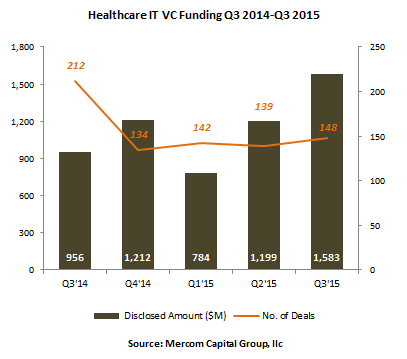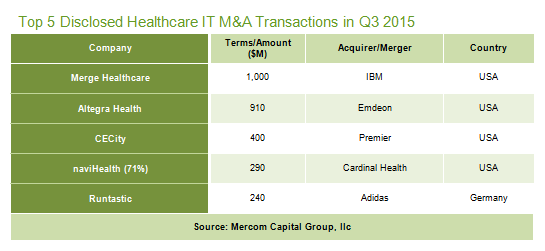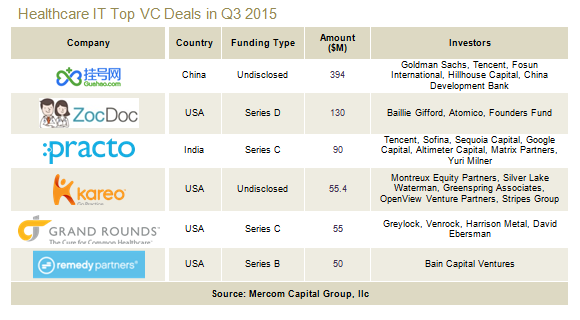Venture capital (VC) funding, including private equity and corporate venture capital, in the Health IT sector increased 32 percent quarter over quarter (QoQ), coming in at $1.6 billion in 148 deals compared to $1.2 billion in 139 deals in Q2 2015; it was also up 66 percent compared to the same quarter of last year. Debt and public market financing in the sector came to $495 million in nine deals including two IPOs. Total corporate funding raised in the sector including VC, Debt and Public Market Financing raised by publicly traded companies and IPOs for Q3 2015 came to $2.1 billion.
To learn more about the report, visit: https://mercom.wpengine.com/product/q3-2015-healthcare-it-digital-health-funding-report/
 VC funding has reached nearly $3.57 billion for 2015 year-to-date (YTD) comparable to the $3.53 billion raised during the same period in 2014.
VC funding has reached nearly $3.57 billion for 2015 year-to-date (YTD) comparable to the $3.53 billion raised during the same period in 2014.
“VC funding into Healthcare IT companies bounced back this quarter after a slow start this year,” commented Raj Prabhu, CEO and Co-Founder of Mercom Capital Group. ‘’Rating, Booking and Comparison Shopping companies had their best fundraising quarter since we began tracking the category.”
Healthcare practice-centric companies raised $357 million in 42 deals compared to $473 million in 41 deals in Q2 2015. Consumer-centric companies raised $1.2 billion in 106 deals this quarter compared to $727 million in 98 deals in Q2 2015.
The top VC funded category this quarter was Rating, Booking & Comparison Shopping which brought in $728 million in 15 deals. Mobile Health companies were second with $319 million in 59 deals, with mHealth Apps receiving $206 million and Wearables/Sensors receiving $88 million. Personal Health and Wellness companies accounted for $114 million in 17 deals, followed by Practice Management Companies with $72 million in five deals. Telehealth companies raised $65 million in 14 deals and Data Analytics companies raised $61 million in 14 deals.
There were 69 early-stage deals at or below $2 million, including 22 Accelerator/Incubator deals.
The top VC deals this quarter included the $394 million raised by Guahao, an online health information portal for patients in China to book appointments with physicians; the $130 million raised by ZocDoc, an online doctor appointment booking platform; the $90 million raised by Practo, developer of a physician search engine to book appointments and rate providers, and of practice management software; the $55.4 million raised by Kareo, a provider of cloud-based medical office software for small medical practices; the $55 million raised by Grand Rounds (previously ConsultingMD), a company that matches patients with specialists and connects them for second opinions on a medical diagnosis; and the $50 million raised by Remedy Partners, a developer of bundled payment programs for government payers, health insurers and self-funded employers.
A total of 285 investors including six Accelerators/Incubators participated in Healthcare IT deals this quarter, 20 of which participated in multiple rounds. The investors with the highest number of funding deals this quarter included Lux Capital, Rock Health, Sequoia Capital, Tencent Holdings, and Zaffre Investments with three deals each. Fifteen other investors participated in two deals each.
Globally, U.S. companies raised $934 million in 121 deals. Fourteen other countries: Australia, Belgium, Canada, China, Estonia, Finland, Germany, India, Israel, Japan, Malaysia, the Netherlands, Singapore, and the U.K. recorded deals amounting to $648 million or about 40 percent of the VC funding this quarter, the largest share of funding for companies outside the U.S. since Mercom began tracking the sector. In the United States, 33 deals were from California, followed by New York with 18 deals, Massachusetts with nine deals and Pennsylvania with eight deals.
Announced debt and public market financing in Health IT fell to $495 million in nine deals this quarter compared to $1.9 billion in nine deals in Q2 2015. There were two IPOs that together accounted for $206 million. Teladoc, a telehealth company that provides 24/7 access to medical care for non-emergency medical issues via phone, secure online video, mobile app or private, walk-in kiosk, raised $180 million through its IPO and began trading on the New York Stock Exchange. Adherium, a developer of a mobile-enabled asthma inhaler that helps manage patients’ adherence to medication, raised $25.6 million through its IPO and began trading on the Australian Securities Exchange.
There were 57 M&A transactions (11 disclosed) in the Health IT sector this quarter compared to 53 transactions (eight disclosed) in Q2 2015. Practice-focused companies accounted for the greatest number of M&A transactions with 39 of the 57, while consumer-centric companies had 18 transactions. Twenty-nine Health Information Management (HIM) companies were acquired this quarter followed by nine Mobile Health (mHealth) companies. Consumer-focused companies have now been involved in 42 M&A transactions this year led by Mobile Health companies with 24.
“Consumer-focused Health IT companies have continued to grab a larger portion of VC funding but have consistently lagged practice-focused companies in M&A activity. This quarter, however, M&A activity increased with 18 consumer-focused transactions, the highest number for these companies in a single quarter. It is a very positive trend if it continues, because IPOs have not proven to be a sure path to success for the sector,” Prabhu further commented.
The Top 5 disclosed M&A transactions were the $1 billion acquisition of Merge Healthcare, a provider of medical imaging management, processing, and interoperability solutions, by IBM; and the $910 million acquisition of Altegra Health, a provider of technology-enabled payment solutions, by Emdeon, a provider of revenue and payment cycle management and clinical information exchange solutions, connecting payers, providers and patients. Premier, a healthcare improvement company, acquired CECity, a developer of a cloud-based data analytics platform that provides performance management and pay-for-value reporting, for $400 million.
 Cardinal Health acquired 71 percent of naviHealth, a provider of post-acute care coordination and management of bundled payment programs, for $290 million; and Adidas acquired Runtastic, a developer of a fitness app, for $240 million.
Cardinal Health acquired 71 percent of naviHealth, a provider of post-acute care coordination and management of bundled payment programs, for $290 million; and Adidas acquired Runtastic, a developer of a fitness app, for $240 million.
There were a total of 551 companies and investors covered in this comprehensive report.
To learn more about the report, visit: https://mercom.wpengine.com/product/q3-2015-healthcare-it-digital-health-funding-report/





